Abstract
Allopurinol, a competitive inhibitor of xanthine oxidase, has been shown to have a protective effect on ischemic myocardium, but its mechanism of action remains controversial. We used an isolated rat heart preparation to test the hypothesis that allopurinol could restore adenosine triphosphate (ATP) levels and improve the recovery of left ventricular function after global myocardial ischemia. Hearts were equilibrated for 30 min, subjected to 10 min of global, normothermic (37 degrees C) ischemia, and reperfused for 15, 30, and 60 min. Hearts treated with allopurinol (100 microM) exhibited greater ATP levels and improved function during reperfusion than did untreated control hearts. Hearts treated with hypoxanthine (100 microM), the substrate for xanthine oxidase, also showed increased ATP and functional recovery compared with controls. These results suggest that allopurinol may protect the globally ischemic myocardium by enhancing the salvage of hypoxanthine for reincorporation into adenine nucleotides.
Full text
PDF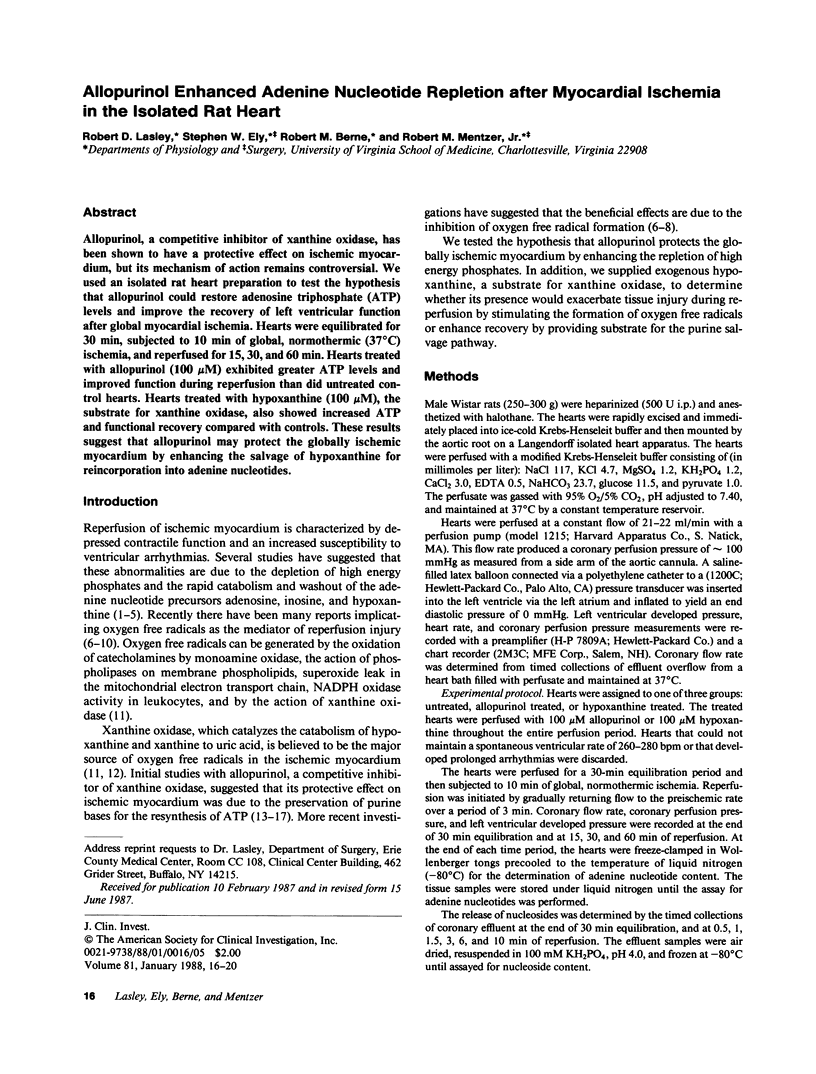
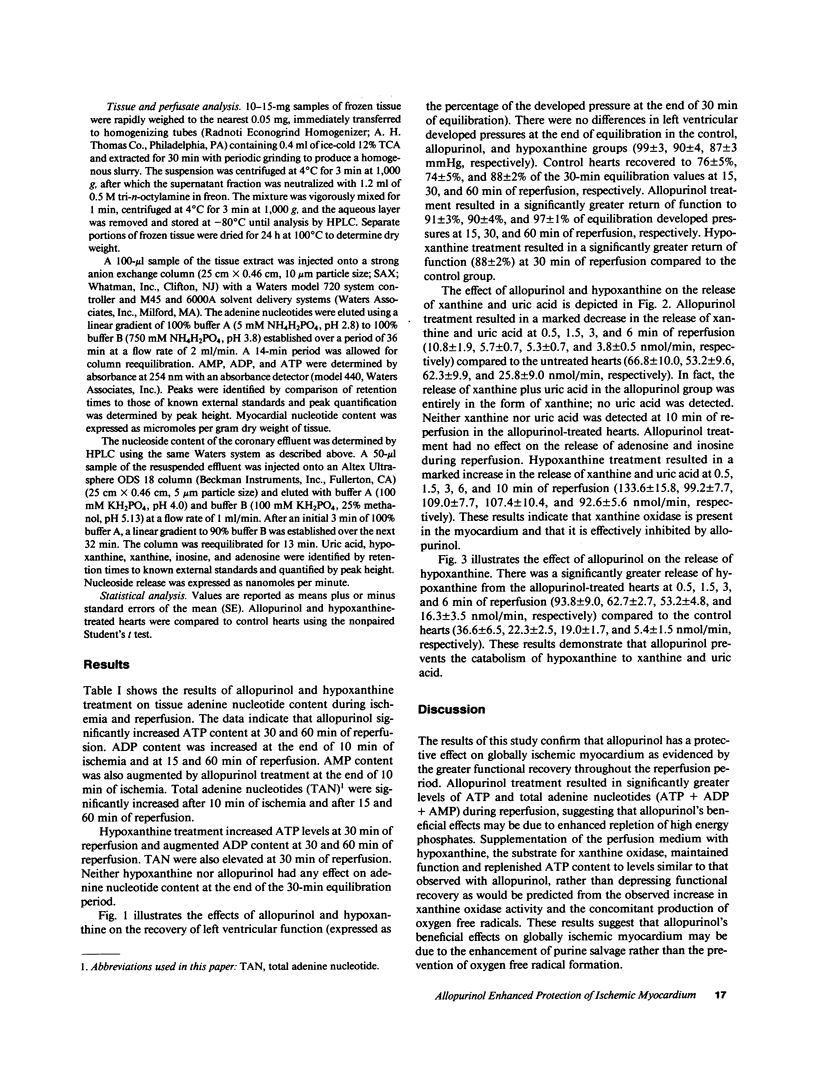
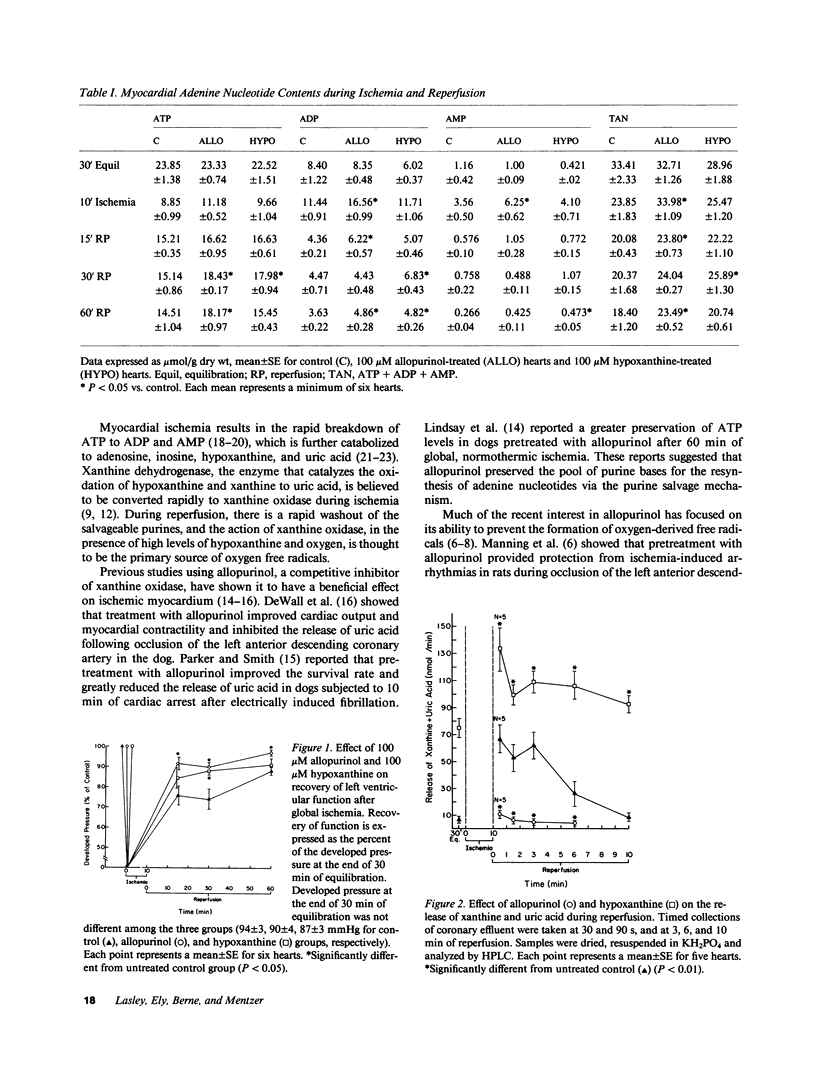
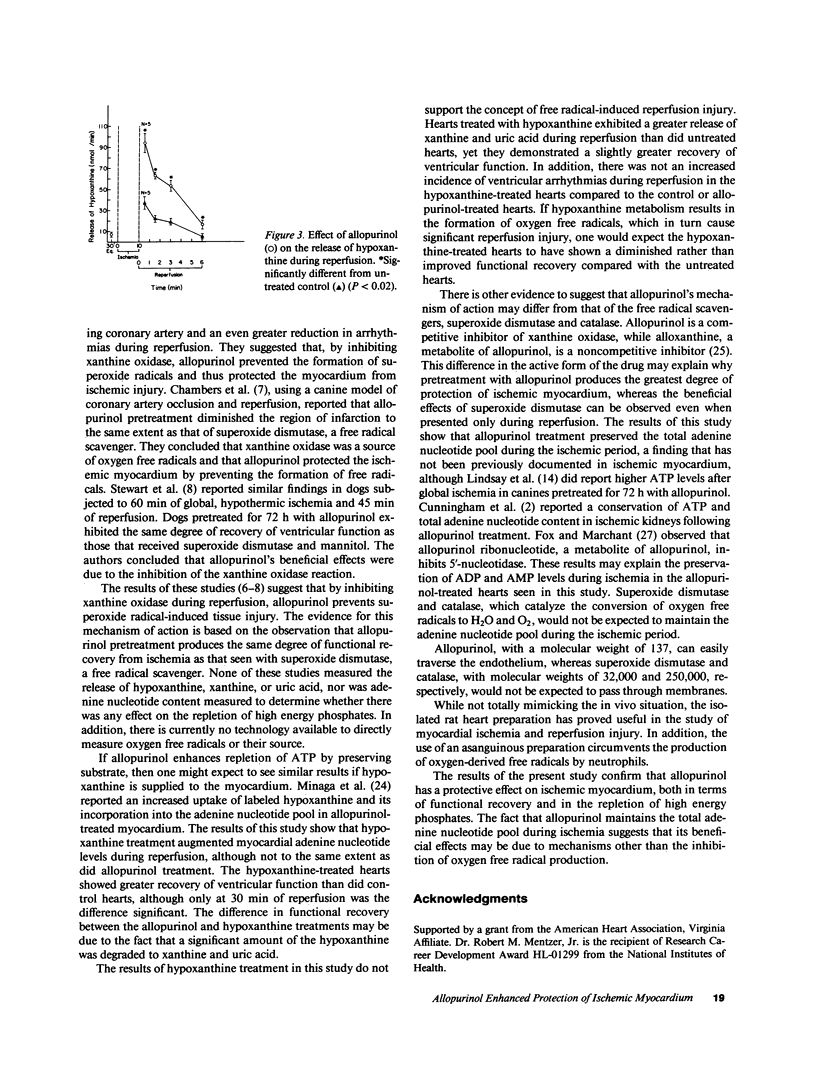
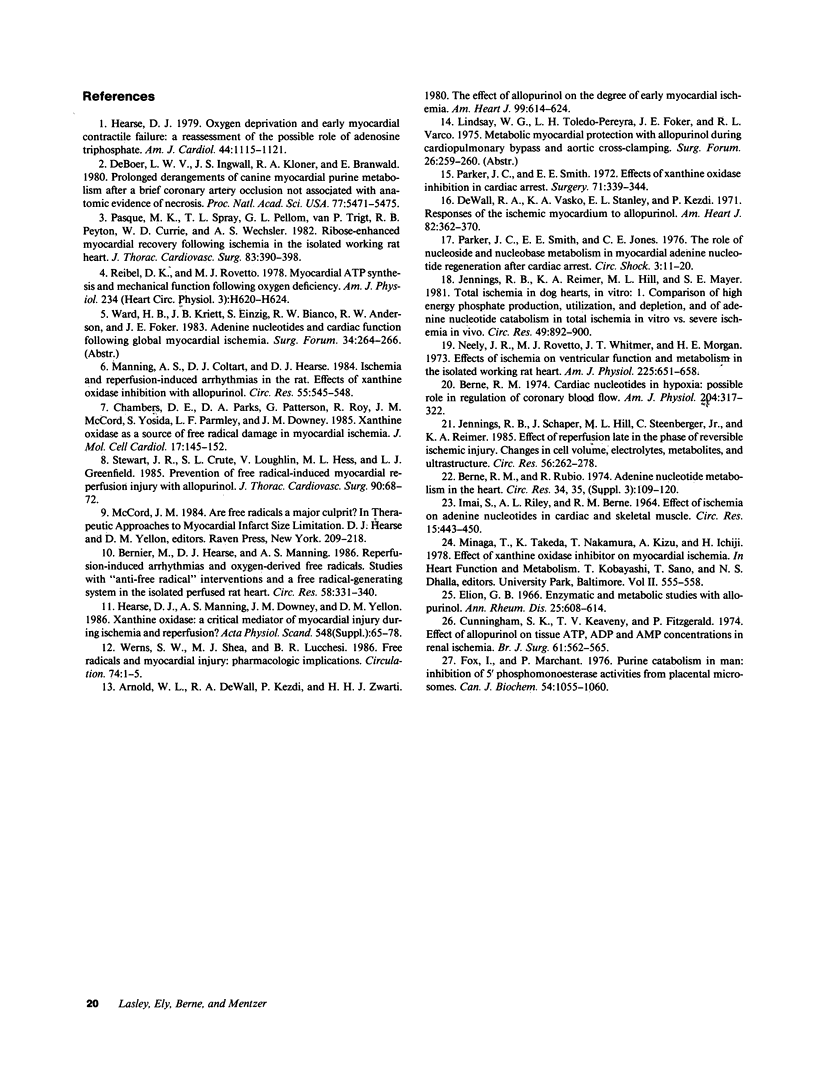
Selected References
These references are in PubMed. This may not be the complete list of references from this article.
- Arnold W. L., DeWall R. A., Kezdi P., Zwart H. H. The effect of allopurinol on the degree of early myocardial ischemia. Am Heart J. 1980 May;99(5):614–624. doi: 10.1016/0002-8703(80)90736-x. [DOI] [PubMed] [Google Scholar]
- Berne R. M., Rubio R. Adenine nucleotide metabolism in the heart. Circ Res. 1974 Sep;35 (Suppl 3):109–120. [PubMed] [Google Scholar]
- Bernier M., Hearse D. J., Manning A. S. Reperfusion-induced arrhythmias and oxygen-derived free radicals. Studies with "anti-free radical" interventions and a free radical-generating system in the isolated perfused rat heart. Circ Res. 1986 Mar;58(3):331–340. doi: 10.1161/01.res.58.3.331. [DOI] [PubMed] [Google Scholar]
- Chambers D. E., Parks D. A., Patterson G., Roy R., McCord J. M., Yoshida S., Parmley L. F., Downey J. M. Xanthine oxidase as a source of free radical damage in myocardial ischemia. J Mol Cell Cardiol. 1985 Feb;17(2):145–152. doi: 10.1016/s0022-2828(85)80017-1. [DOI] [PubMed] [Google Scholar]
- Cunningham S. K., Keaveny T. V., Fitzgerald P. Effect of allopurinol on tissue ATP, ADP and AMP concentrations in renal ischaemia. Br J Surg. 1974 Jul;61(7):562–565. doi: 10.1002/bjs.1800610716. [DOI] [PubMed] [Google Scholar]
- DeBoer L. W., Ingwall J. S., Kloner R. A., Braunwald E. Prolonged derangements of canine myocardial purine metabolism after a brief coronary artery occlusion not associated with anatomic evidence of necrosis. Proc Natl Acad Sci U S A. 1980 Sep;77(9):5471–5475. doi: 10.1073/pnas.77.9.5471. [DOI] [PMC free article] [PubMed] [Google Scholar]
- DeWall R. A., Vasko K. A., Stanley E. L., Kezdi P. Responses of the ischemic myocardium to allopurinol. Am Heart J. 1971 Sep;82(3):362–370. doi: 10.1016/0002-8703(71)90302-4. [DOI] [PubMed] [Google Scholar]
- Elion G. B. Enzymatic and metabolic studies with allopurinol. Ann Rheum Dis. 1966 Nov;25(6 Suppl):608–614. doi: 10.1136/ard.25.suppl_6.608. [DOI] [PMC free article] [PubMed] [Google Scholar]
- Fox I. H., Marchant P. J. Purine catabolism in man: inhibition of 5'-phosphomonesterase activities from placental microsomes. Can J Biochem. 1976 Dec;54(12):1055–1060. doi: 10.1139/o76-154. [DOI] [PubMed] [Google Scholar]
- Hearse D. J., Manning A. S., Downey J. M., Yellon D. M. Xanthine oxidase: a critical mediator of myocardial injury during ischemia and reperfusion? Acta Physiol Scand Suppl. 1986;548:65–78. [PubMed] [Google Scholar]
- Hearse D. J. Oxygen deprivation and early myocardial contractile failure: a reassessment of the possible role of adenosine triphosphate. Am J Cardiol. 1979 Nov;44(6):1115–1121. doi: 10.1016/0002-9149(79)90177-2. [DOI] [PubMed] [Google Scholar]
- IMAI S., RILEY A. L., BERNE R. M. EFFECT OF ISCHEMIA ON ADENINE NUCLEOTIDES IN CARDIAC AND SKELETAL MUSCLE. Circ Res. 1964 Nov;15:443–450. doi: 10.1161/01.res.15.5.443. [DOI] [PubMed] [Google Scholar]
- Jennings R. B., Reimer K. A., Hill M. L., Mayer S. E. Total ischemia in dog hearts, in vitro. 1. Comparison of high energy phosphate production, utilization, and depletion, and of adenine nucleotide catabolism in total ischemia in vitro vs. severe ischemia in vivo. Circ Res. 1981 Oct;49(4):892–900. doi: 10.1161/01.res.49.4.892. [DOI] [PubMed] [Google Scholar]
- Jennings R. B., Schaper J., Hill M. L., Steenbergen C., Jr, Reimer K. A. Effect of reperfusion late in the phase of reversible ischemic injury. Changes in cell volume, electrolytes, metabolites, and ultrastructure. Circ Res. 1985 Feb;56(2):262–278. doi: 10.1161/01.res.56.2.262. [DOI] [PubMed] [Google Scholar]
- Lindsay W. G., Toledo-Pereyra L. H., Foker J. E., Varco R. L. Metabolic myocardial protection with allopurinol during cardiopulmonary bypass and aortic cross-clamping. Surg Forum. 1975;26:259–260. [PubMed] [Google Scholar]
- Manning A. S., Coltart D. J., Hearse D. J. Ischemia and reperfusion-induced arrhythmias in the rat. Effects of xanthine oxidase inhibition with allopurinol. Circ Res. 1984 Oct;55(4):545–548. doi: 10.1161/01.res.55.4.545. [DOI] [PubMed] [Google Scholar]
- Neely J. R., Rovetto M. J., Whitmer J. T., Morgan H. E. Effects of ischemia on function and metabolism of the isolated working rat heart. Am J Physiol. 1973 Sep;225(3):651–658. doi: 10.1152/ajplegacy.1973.225.3.651. [DOI] [PubMed] [Google Scholar]
- Parker J. C., Smith E. E. Effects of xanthine oxidase inhibition in cardiac arrest. Surgery. 1972 Mar;71(3):339–344. [PubMed] [Google Scholar]
- Pasque M. K., Spray T. L., Pellom G. L., Van Trigt P., Peyton R. B., Currie W. D., Wechsler A. S. Ribose-enhanced myocardial recovery following ischemia in the isolated working rat heart. J Thorac Cardiovasc Surg. 1982 Mar;83(3):390–398. [PubMed] [Google Scholar]
- Reibel D. K., Rovetto M. J. Myocardial ATP synthesis and mechanical function following oxygen deficiency. Am J Physiol. 1978 May;234(5):H620–H624. doi: 10.1152/ajpheart.1978.234.5.H620. [DOI] [PubMed] [Google Scholar]
- Stewart J. R., Crute S. L., Loughlin V., Hess M. L., Greenfield L. J. Prevention of free radical-induced myocardial reperfusion injury with allopurinol. J Thorac Cardiovasc Surg. 1985 Jul;90(1):68–72. [PubMed] [Google Scholar]
- Werns S. W., Shea M. J., Lucchesi B. R. Free radicals and myocardial injury: pharmacologic implications. Circulation. 1986 Jul;74(1):1–5. doi: 10.1161/01.cir.74.1.1. [DOI] [PubMed] [Google Scholar]



